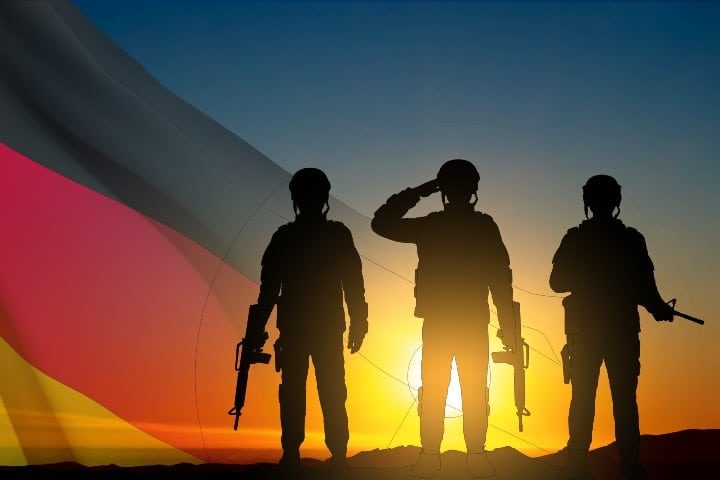
Hundreds of German troops are poised to be involved in transnational military drills in Australia, as Berlin recalibrates its foreign policy priorities in the Indo-Pacific region amid a rising China.
The German troops will participate in the biennial Talisman Sabre exercise, which encompasses more than 30,000 soldiers from 12 different nations set up to simulate landing operations and jungle warfare.
Notwithstanding existing questions about fighting abilities and mediocre equipment, Germany set aside existing postwar doubts about deploying troops overseas when the government in June declared its plans to place 4,000 troops in Lithuania permanently, supposedly to counter any possible invading Russians.
In Australia, paratroopers and marines, who comprise most of the 240-strong German contingent, will train alongside their Japanese, American, British, Australian, and Indonesian counterparts in drills deemed as de facto exercises against a potential Chinese invasion of Taiwan.
Hosted every two years since 2005 by America and Australia, the Talisman Sabre exercises have been viewed as preparatory exercises by Western armies and local powers to fend off potential Chinese pugilism and defend the strategically crucial South China Sea.
Thirteen German warplanes took part in joint multinational exercises in Australia in August last year to tackle a potential Chinese incursion, illustrating Berlin’s increasingly militarized foreign policy.
In an interview with the German press, German Army chief Alfons Mais admitted that the country was experiencing a geopolitical tussle far more complex than the Cold War.
Mobilizing German military personnel overseas has traditionally been frowned upon owing to Germany’s role in the Second World War. However, following the outbreak of the Russo-Ukrainian crisis in February 2022, as well as due to mounting pressure from America to overhaul the German military, the European country has since stepped up its attempts to revamp itself and become more proactive in the international arena.
Berlin has had to walk a tightrope in balancing out its diplomatic ties with America and its Western allies to decouple from Beijing and protecting its own economy from the fallout of any sanctions imposed on Beijing.
Unlike its neighbor France, Germany has yet to craft an official position to deal with the risk of a split from the U.S.-led Western alliance against Beijing on the Taiwan issue.
At the moment, the German Army is going through a military buildup, hoping to increase its forces by 20,000 soldiers by 2031 and getting more involved in common European defense strategies after being slammed for its inadequacy by other NATO members.
In the past, German troops have been active in both Mali and Afghanistan, but the Talisman Sabre exercise is a significant step toward more German military involvement in Asia.
This week, during a speech in New York City at a ceremony commemorating the 25th anniversary of the creation of the International Criminal Court (ICC), German Foreign Minister Annalena Baerbock urged for the implementation of arrest warrants for Russian President Vladimir Putin for alleged war crimes.
Baerbock also asked the ICC to address gaps hindering its ability to arrest heads of state who participate in wars of aggression.
“Doing nothing, not trying, that would be wrong. Because if we don’t respond, the international community’s response to Russia’s aggression is impunity,” she declared, before elaborating that such a situation would imply that the world would become “a place where all states will live in fear of a larger neighbor.”
“My country, Germany, has waged inhumane wars of aggression and committed the most cruel genocide, killing millions of people,” Baerbock said, alluding to the Second World War. “That’s why we have a special responsibility to do our part to ensure that such crimes never happen again.”
“Peace through law. This is the strength that the international community holds against Russia’s brutal war of aggression,” she proclaimed.
Baerbock’s demand for Putin’s arrest came more than a month before the Russian leader was scheduled to visit South Africa in August for a summit of the BRICS (Brazil, Russia, India China, and South Africa) countries. However, it was recently announced that Putin will not attend the meeting, and that Foreign Minister Sergey Lavrov will be representing Russia instead. The BRICS summit would have been the first time Putin had left Russia since the ICC warrant was issued in March.
Although the Democratic Alliance (DA), the main opposition party in South Africa, had tried to pressure their government to arrest Putin should he enter the country, this likely would not have happened, as South African President Cyril Ramaphosa had characterized such an arrest as an act of war.
“Russia has made it clear that arresting its sitting President would be a declaration of war,” Ramaphosa said. “It would be inconsistent with our Constitution to risk engaging in war with Russia.”
South Africa, which is a signatory to and has ratified the ICC’s Rome statute, has stated that doing so could jeopardize the “security, peace and order of the state.”
Some analysts have speculated that Ramaphosa’s remarks were based on comments made by former Russian President Dmitry Medvedev, who stated in March that any move to arrest Putin in another country would be seen as a provocative statement of war against Russia.
“Let’s imagine—obviously this situation which will never be realized but nevertheless let’s imagine that it was realized: The current head of the nuclear state went to a territory, say Germany, and was arrested,” Medvedev said.
“What would that be? It would be a declaration of war on the Russian Federation,” he said. “And in that case, all our assets—all our missiles et cetera—would fly to the Bundestag, to the Chancellor’s office.”
Medvedev, who is serving as deputy chairman of the Security Council of the Russian Federation, also issued an ominous warning to the ICC itself after the latter issued the warrant for Putin. “It is quite possible to imagine a hypersonic missile being fired from the North Sea from a Russian ship at the Hague courthouse. Everyone walks under God and rockets. Look carefully at the sky.…” he said.
Previously this year, the president of the International Criminal Court, Polish Judge Piotr Hofmański, issued a statement declaring arrest warrants issued for Putin over charges that Russia had supposedly transferred Ukrainian children out of Ukraine during the ongoing conflict between the two countries.
Hofmański declared that “it is forbidden by international law for occupying powers to transfer civilians from the territory they live in to other territories. Children enjoy special protection under the Geneva Convention.”



